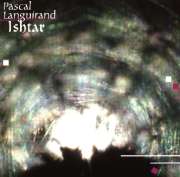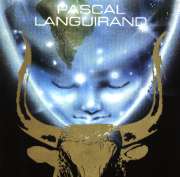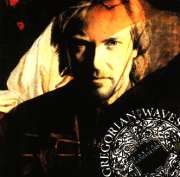PASCAL
LANGUIRAND,
A
VERSATILE MUSICAL STYLE
By: Manuel Montes & Jorge Munnshe
Pascal
Languirand is one of the most important avantgarde
composers from Canada. Since his first album, in 1978, he has
proved his imagination in everything he has done, from
soundtracks for television to dance electronic music as is the
case of his song Living on Video (Trans-X),
which sold more than two million copies, and which got a platinum
disc in Mexico.
Through long encounters we have had with
him in different occasions during these last years, we have been
able to get to know his viewpoints on the musical avantgarde, as
well as his most important artistic ideas.
 Living on
Video has become a classic of Techno, and
one of the most avantgarde samples of dance music in the
eighties. Yet Pascal is not exclusively involved
with Techno. Since his first album in 1978, he
has explored various fields within the alternative musics, following
his particular musical path that in the late 1970s took him towards Cosmic
Music. Composing Living On Video and founding
the band Trans-X responded to a momentary
amusement, a sporadic incursion outside his usual artistic line.
This prank opened him the door of fame and money. It would have
been very easy for Pascal to reject his more
personal artistic ideas and allow himself to be seduced by the
promotion to Pop Star, a temptation that so many artists that at
one time in their careers used to be radically alternative ones
have fallen prey to, thus becoming dully commercial ones. Of
course, having become Big Business for the record companies,
caused him to suffer great pressures so that he kept to the path
he had started. "They wanted to tell me what I had to compose.
It's not strange, since many people have got luxurious houses and
cars at my expense. All these intermediaries from the recording
companies wanted to continue exploiting my success to their own advantage.
This is why I left the game. I wanted to follow my own career,
not to become a puppet of the recording companies."
Living on
Video has become a classic of Techno, and
one of the most avantgarde samples of dance music in the
eighties. Yet Pascal is not exclusively involved
with Techno. Since his first album in 1978, he
has explored various fields within the alternative musics, following
his particular musical path that in the late 1970s took him towards Cosmic
Music. Composing Living On Video and founding
the band Trans-X responded to a momentary
amusement, a sporadic incursion outside his usual artistic line.
This prank opened him the door of fame and money. It would have
been very easy for Pascal to reject his more
personal artistic ideas and allow himself to be seduced by the
promotion to Pop Star, a temptation that so many artists that at
one time in their careers used to be radically alternative ones
have fallen prey to, thus becoming dully commercial ones. Of
course, having become Big Business for the record companies,
caused him to suffer great pressures so that he kept to the path
he had started. "They wanted to tell me what I had to compose.
It's not strange, since many people have got luxurious houses and
cars at my expense. All these intermediaries from the recording
companies wanted to continue exploiting my success to their own advantage.
This is why I left the game. I wanted to follow my own career,
not to become a puppet of the recording companies."
Choosing artistic freedom over
commercial success is a trait that magnifies the figure of any
artist. Thus, in the case of Pascal Languirand,
nobody can accuse him of composing under the influence of commercial
requirements.
The son of Canadian parents, he was born
in 1955 in Paris. Although he was brought up in Canada, he often
travelled to Mexico. The reason for this was that he used to
accompany his father, a writer, who felt fascinated by this
country and found there the necessary inspiration to write his
books. Pascal told us that because of this, at
age four he had already learnt some Spanish while playing with
Mexican children his age.
 At age 18 he developed
his interest in composing music. Because of that, he began to study
electronic music and communications at the McGuill University, as
well as some cinematography at Concordia University. "Above
all, I loved experimenting. I used to do so with tape, especially
with my four-track recorder, with the electric guitar, something
like Pink Floyd, playing with echo,
the bass. Therefore, I based my work on the manipulation of
sounds. My university studies, in actual fact, did not have any real
usefulness for me. I preferred to experiment on my own."
At age 18 he developed
his interest in composing music. Because of that, he began to study
electronic music and communications at the McGuill University, as
well as some cinematography at Concordia University. "Above
all, I loved experimenting. I used to do so with tape, especially
with my four-track recorder, with the electric guitar, something
like Pink Floyd, playing with echo,
the bass. Therefore, I based my work on the manipulation of
sounds. My university studies, in actual fact, did not have any real
usefulness for me. I preferred to experiment on my own."
In 1978 his first album, Minos,
was released. According to him, it was not difficult for him to
get it released. He attributes this ease at the fact that back
then electronic music was something new, something that attracted
a lot of attention, which is why his television appearances were
quite frequent, and he was often interviewed about his peculiar
musical style.
With his second album, De Harmonia
Universalia, in 1980, he shaped one of the most typical traits
of identity of his music: the abolishing of the frontiers of
time. He merged, with an astonishing perfection, Gregorian chants
and cosmic melodies with synthesizers, thus creating a style that
has been defined as the New Classical Romanticism.
He defined his musical concept as "Music from a rising civilization."
Of his latter work composing
soundtracks, the album Vivre Ici Maintenant was
released, which contains his music for a Canadian television
series.
 After his stage as Trans-X, Pascal
kept silent for several years, during which he lived in the
United States. After that, he appeared once again on the public
stage with his album Gregorian Waves, the prophecy of
the advent of a New Renaissance, through the cult to the Goddess
Earth, an avantgarde and at the same time a classical work,
shrouded in warmth and mysticism. In this album he incorporated
Latin texts written by himself.
After his stage as Trans-X, Pascal
kept silent for several years, during which he lived in the
United States. After that, he appeared once again on the public
stage with his album Gregorian Waves, the prophecy of
the advent of a New Renaissance, through the cult to the Goddess
Earth, an avantgarde and at the same time a classical work,
shrouded in warmth and mysticism. In this album he incorporated
Latin texts written by himself.
Ishtar appeared in
1993. Almost at the same time, Pascal Languirand, a
compilatory CD gathering songs from his first two albums plus a
new theme, was released. Soon after, Michel Huygen
(Neuronium) collaborated with Languirand
as the producer of a new work by him and Henri Chalifour
as Trans-X.
It must be noted that Pascal
does not consider himself to subscribe any given musical trend,
nor does he distinguish between acoustic and electronic. He does not
hesitate to admit he utilizes the computer, yet at the same time
he takes advantage of the possibilities offered by acoustic
sound, voices and ideas expressed in his texts: "The
texts that I sometimes include in my music, are an inseparable
part of it. They form a whole. I would never merge a music and a
text that didn't fit together. It's very important for me that
the texts have their poetic side and that they always have some meaning.
That they are not the typical unimportant lyrics to fill in. On
the other hand, I think it vital to sing in other languages besides
English. It's very important to spread the culture from many
different countries so as to prevent being immersed in the culture
of a few, the Anglo-Saxon one. This is why I try to diversify the
languages I incorporate to my themes. I also love exploiting the
different vocal texture of each language."
 When we asked him about
his method for composing, he answered: "To have any musical
ideas occur to me, I must have something within myself. The mere
wish to compose does not cause me to have any ideas. Instead,
when I notice I have some idea, a mere ten minutes may suffice to
leave a piece almost finished. The melody is a very important
element in my music. As a result of this, I can, for instance,
compose something I will record with synthesizers with the help
of a simple acoustic guitar."
When we asked him about
his method for composing, he answered: "To have any musical
ideas occur to me, I must have something within myself. The mere
wish to compose does not cause me to have any ideas. Instead,
when I notice I have some idea, a mere ten minutes may suffice to
leave a piece almost finished. The melody is a very important
element in my music. As a result of this, I can, for instance,
compose something I will record with synthesizers with the help
of a simple acoustic guitar."
He believes that the artists should
reflect what happens in the society, that music should not be merely
an art but show what happens around us as well instead. In this
sense, Pascal declares himself committed to his
environment.
Pascal
Languirand and Michel Huygen have known
each other since about fifteen years ago, and mutually admire one another's
work. However, they have never felt influenced by the other, as they
stated when we asked them about this possibility.
The human side of Pascal
Languirand is by no means what one might fear from a
musician having been awarded a platinum disc, who sold more than
two million copies of a song, and who was in the lists of the top
ten in several European nations. Every time we have met him, we
have felt we were with a friend with whom one speaks about music,
instead of being journalists interviewing a famous star to write
an article about him.

 Previous Page (Articles/News)
Previous Page (Articles/News)
 Living on
Video has become a classic of Techno, and
one of the most avantgarde samples of dance music in the
eighties. Yet Pascal is not exclusively involved
with Techno. Since his first album in 1978, he
has explored various fields within the alternative musics, following
his particular musical path that in the late 1970s took him towards Cosmic
Music. Composing Living On Video and founding
the band Trans-X responded to a momentary
amusement, a sporadic incursion outside his usual artistic line.
This prank opened him the door of fame and money. It would have
been very easy for Pascal to reject his more
personal artistic ideas and allow himself to be seduced by the
promotion to Pop Star, a temptation that so many artists that at
one time in their careers used to be radically alternative ones
have fallen prey to, thus becoming dully commercial ones. Of
course, having become Big Business for the record companies,
caused him to suffer great pressures so that he kept to the path
he had started. "They wanted to tell me what I had to compose.
It's not strange, since many people have got luxurious houses and
cars at my expense. All these intermediaries from the recording
companies wanted to continue exploiting my success to their own advantage.
This is why I left the game. I wanted to follow my own career,
not to become a puppet of the recording companies."
Living on
Video has become a classic of Techno, and
one of the most avantgarde samples of dance music in the
eighties. Yet Pascal is not exclusively involved
with Techno. Since his first album in 1978, he
has explored various fields within the alternative musics, following
his particular musical path that in the late 1970s took him towards Cosmic
Music. Composing Living On Video and founding
the band Trans-X responded to a momentary
amusement, a sporadic incursion outside his usual artistic line.
This prank opened him the door of fame and money. It would have
been very easy for Pascal to reject his more
personal artistic ideas and allow himself to be seduced by the
promotion to Pop Star, a temptation that so many artists that at
one time in their careers used to be radically alternative ones
have fallen prey to, thus becoming dully commercial ones. Of
course, having become Big Business for the record companies,
caused him to suffer great pressures so that he kept to the path
he had started. "They wanted to tell me what I had to compose.
It's not strange, since many people have got luxurious houses and
cars at my expense. All these intermediaries from the recording
companies wanted to continue exploiting my success to their own advantage.
This is why I left the game. I wanted to follow my own career,
not to become a puppet of the recording companies."  At age 18 he developed
his interest in composing music. Because of that, he began to study
electronic music and communications at the McGuill University, as
well as some cinematography at Concordia University. "Above
all, I loved experimenting. I used to do so with tape, especially
with my four-track recorder, with the electric guitar, something
like Pink Floyd, playing with echo,
the bass. Therefore, I based my work on the manipulation of
sounds. My university studies, in actual fact, did not have any real
usefulness for me. I preferred to experiment on my own."
At age 18 he developed
his interest in composing music. Because of that, he began to study
electronic music and communications at the McGuill University, as
well as some cinematography at Concordia University. "Above
all, I loved experimenting. I used to do so with tape, especially
with my four-track recorder, with the electric guitar, something
like Pink Floyd, playing with echo,
the bass. Therefore, I based my work on the manipulation of
sounds. My university studies, in actual fact, did not have any real
usefulness for me. I preferred to experiment on my own." After his stage as Trans-X, Pascal
kept silent for several years, during which he lived in the
United States. After that, he appeared once again on the public
stage with his album Gregorian Waves, the prophecy of
the advent of a New Renaissance, through the cult to the Goddess
Earth, an avantgarde and at the same time a classical work,
shrouded in warmth and mysticism. In this album he incorporated
Latin texts written by himself.
After his stage as Trans-X, Pascal
kept silent for several years, during which he lived in the
United States. After that, he appeared once again on the public
stage with his album Gregorian Waves, the prophecy of
the advent of a New Renaissance, through the cult to the Goddess
Earth, an avantgarde and at the same time a classical work,
shrouded in warmth and mysticism. In this album he incorporated
Latin texts written by himself. When we asked him about
his method for composing, he answered: "To have any musical
ideas occur to me, I must have something within myself. The mere
wish to compose does not cause me to have any ideas. Instead,
when I notice I have some idea, a mere ten minutes may suffice to
leave a piece almost finished. The melody is a very important
element in my music. As a result of this, I can, for instance,
compose something I will record with synthesizers with the help
of a simple acoustic guitar."
When we asked him about
his method for composing, he answered: "To have any musical
ideas occur to me, I must have something within myself. The mere
wish to compose does not cause me to have any ideas. Instead,
when I notice I have some idea, a mere ten minutes may suffice to
leave a piece almost finished. The melody is a very important
element in my music. As a result of this, I can, for instance,
compose something I will record with synthesizers with the help
of a simple acoustic guitar."